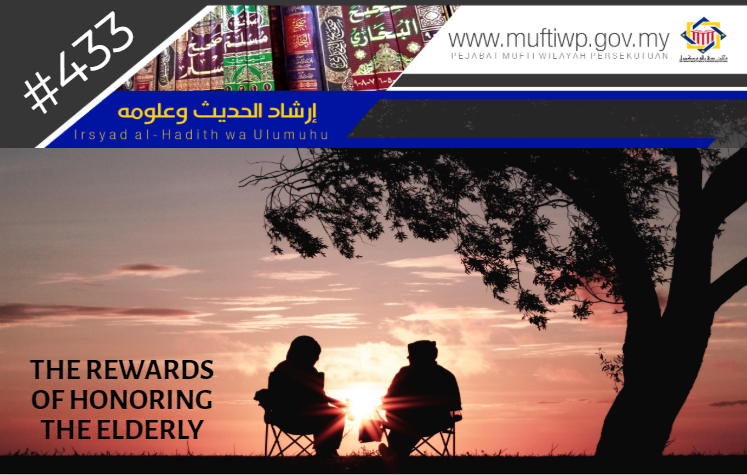
Question:
Is it true there is a hadith that states by honoring the elderly, he will be honored when he eventually reached old age?
Answer:
Alhamdulillah, praise and thanks to Allah for the countless blessings He has blessed us all with. Blessings and salutations to the Prophet Muhammad PBUH, his wives, his family, companions and all those that follow his teachings to the day of judgement.
Islam is a religion that emphasized manners in communication among people whether they are Muslims or non-Muslims. For this, among the reasons Allah SWT sent the Prophet Muhammad PBUH is to perfect good character and conduct to all mankind. This is in accordance with the statement of the Prophet PBUH:
إِنَّمَا بُعِثْتُ لِأُتَمِّمَ صَالِحَ الْأَخْلَاقِ
"I was sent to perfect good character."
Musnad Ahmad (8952) [Syeikh Syu’aib al-Arna’outh state the hadith is sahih (auhtentic) and its sanad (chain of narrators) is strong]
Among good character and conduct is by respecting each other. We are not only commanded to respect and honor our parents, but we are also asked to respect and honor the elderly even if they are not our family members.
Referring to the above question, there is a hadith narrated by Imam al-Tirmizi and its status is not very strong:
- From Anas bin Malik RA, it is said the Prophet PBUH said:
مَا أَكْرَمَ شَابٌّ شَيْخًا لِسِنِّهِ إِلَّا قَيَّضَ اللَّهُ لَهُ مَنْ يُكْرِمُهُ عِنْدَ سِنِّهِ
"No young person honors an elder due to his age, except that Allah appoints for him one who will honor him at that age."
Sunan al-Tirmizi (2022) [Imam al-Tirmizi state the hadith is gharib][Imam al-Suyuthi state the hadith is hasan in al-Jami’. While Syeikh Syu’aib al-Arna’outh said there are two narrators in the sanad of the hadith and it is stated as dhaif (weak) by scholars which are; Abu al-Rahhal Khalid bin Muhammad bin Yazid bin Bayan]
Furthermore, there is also a hadith from the Prophet PBUH who encourages us to love people who are younger than us and respect those who are older than us:
- From Anas bin Malik RA, it is said the Prophet PBUH said:
لَيْسَ مِنَّا مَنْ لَمْ يَرْحَمْ صَغِيرَنَا وَيُوَقِّرْ كَبِيرَنَا
“He is not among us who does not have mercy on our young and does not respect our elders.”
Sunan al-Tirmizi (1919) [Imam al-Tirmizi said the hadith is gharib] [Imam al-Suyuthi state the hadith is sahih (authentic) in al-Jami’. While Syeikh Syu’aib al-Arna’outh said there is a narrator in the sanad of this hadith that is evaluated as weak by scholars who is Laith bin Abi Salim and the other narrators are thiqah (trustworthy). This hadith is also supported by other narrations]
Thus, both hadiths above are dhaif (weak) due to the fact that the narrator in their sanad is evaluated as dhaif by scholars. However, there is an authentic general hadith in the commandment of honoring, loving and caring among people:
- From Abu Hurairah RA, the Prophet PBUH said:
مَنْ لاَ يَرْحَمُ لاَ يُرْحَمُ
"He who is not merciful to others, will not be treated mercifully.”
Sahih al-Bukhari (5997)
Conclusion
To conclude, the hadith from the Prophet PBUH is dhaif (weak). However, the meaning is accepted by understanding that we are commanded to honor or respect whoever for it is the beauty of Islam. Lastly, let us all try to be a Muslim with the best character and conduct and make the Prophet PBUH our best example. Amin.
Wallahua’lam.

